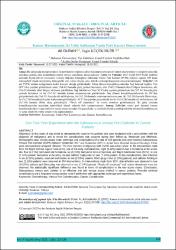Kanser hastalarında iki yıllık subkutan venöz port kateter deneyimimiz

Göster/Aç
Erişim
info:eu-repo/semantics/openAccesshttp://creativecommons.org/licenses/by-nc/3.0/us/Tarih
2022Üst veri
Tüm öğe kaydını gösterÖzet
Amaç: Bu çalışmada malignite tanısı ile port kateter implante edilen hastaların retrospektif olarak incelenmesi ve takipleri sırasında
meydana gelmiş olan komplikasyonların ortaya konulması amaçlanmıştır. Gereç ve Yöntem: 2017 Eylül-2019 Eylül tarihleri
arasında Aydın Devlet Hastanesi Cerrahi Onkoloji Kliniğinde Subkutan Venöz Port Kateter (SVPK) takılan toplam 109 hasta
retrospektif olarak incelenmiş demografik veri, venöz erişim yolu, teknik ve komplikasyonlar ortaya konulmuştur. Bulgular: En
sık SVPK takılan malignitenin kolon kanseri olduğu görülmüştür. Erken dönem komplikasyonlardan Sağ İnternal Jugüler Ven
(İJV)’den yapılan girişimlerde sekiz (%8.42) hastada giriş yerinde hematom, dört (%4.21) hastada tünel bölgesi hematomu, altı
(%6.31) hastada tünel bölgesi ekimozu görülürken, Sağ Subklavien Ven (SCV)’den yapılan girişimlerde bir (%7.14) hastada giriş
yerinde hematom ve bir (%7.14) hastada kateter malpozisyonu görülmüştür. Geç dönem komplikasyonlarında da İJV’den
girişimlerinde altı (%6.31) hastada cilt enfeksiyonu, iki (%2.10) hastada rezervuar malrotasyonu, iki (%2.10) hastada fibrin tıkaç,
iki (%2.10) hastada da kateter katlanması görülmüştür. SCV’den yapılan girişimlerde ise iki (%14.28) hastada cilt enfeksiyonu, bir
(%7.14) hastada fibrin tıkaç görülmüştür. “Pinch off sendromu” ve venöz tromboz görülmemiştir. İki giriş yolunda
komplikasyonlar açısından istatistiksel olarak anlamlı fark saptanmamıştır. Sonuç: Subkutan venöz port kateteri kanser
hastalarında etkin ve güvenilir bir venöz erişim yoludur. Uygun teknik ve tecrübeli ellerde yapıldığı taktirde minimal komplikasyon
ve uzun süreli bir venöz erişim yolu sağlamaktadır. Objective: In this study, it was aimed to retrospectively examine the patients who were implanted with a port catheter with the
diagnosis of malignancy and to reveal the complications that occurred during their follow-up. Materials and Methods:
Demographic data, venous access route, technique and complications of a total of 109 patients who were inserted Subcutaneous
Venous Port Catheter (SVPK) between September 2017 and September 2019 in Aydın State Hospital Surgical Oncology Clinic
were retrospectively analyzed. Results: The most common malignancy with CVPK was colon cancer. In the interventions made
from the Right Internal Jugular Vein (IJV), one of the early complications, eight (8.42%) patients had a hematoma at the access
site, four (4.21%) had tunnel site hematoma, six (6.31%) had tunnel zone ecchymosis, and Right Subclavian Vein (SCV) in one
(7.14%) patient, hematoma at the entry site and catheter malposition in one (7.14%) patient. In late complications, skin infection
in six (6.31%) patients, reservoir malrotation in two (2.10%) patients, fibrin plug in two (2.10%) patients, and catheter folding in
two (2.10%) patients were observed in IJV interventions. In interventions made from SCV, skin infection was observed in two
(14.28%) patients and fibrin plug was observed in one (7.14%) patient. “Pinch off syndrome” and venous thrombosis were not
observed. No statistically significant difference was found in terms of complications in the two access routes. Conclusion:
Subcutaneous venous port catheter is an effective and safe venous access method in cancer patients. Provides minimal
complications and a long-term venous access route if performed with appropriate technique and experienced hands.
Keywords: Chemotherapy, Venous Port Catheterization, Cancer, Complication.
Kaynak
Balıkesir Sağlık Bilimleri DergisiCilt
11Sayı
1Koleksiyonlar
Aşağıdaki lisans dosyası bu öğe ile ilişkilidir:


















